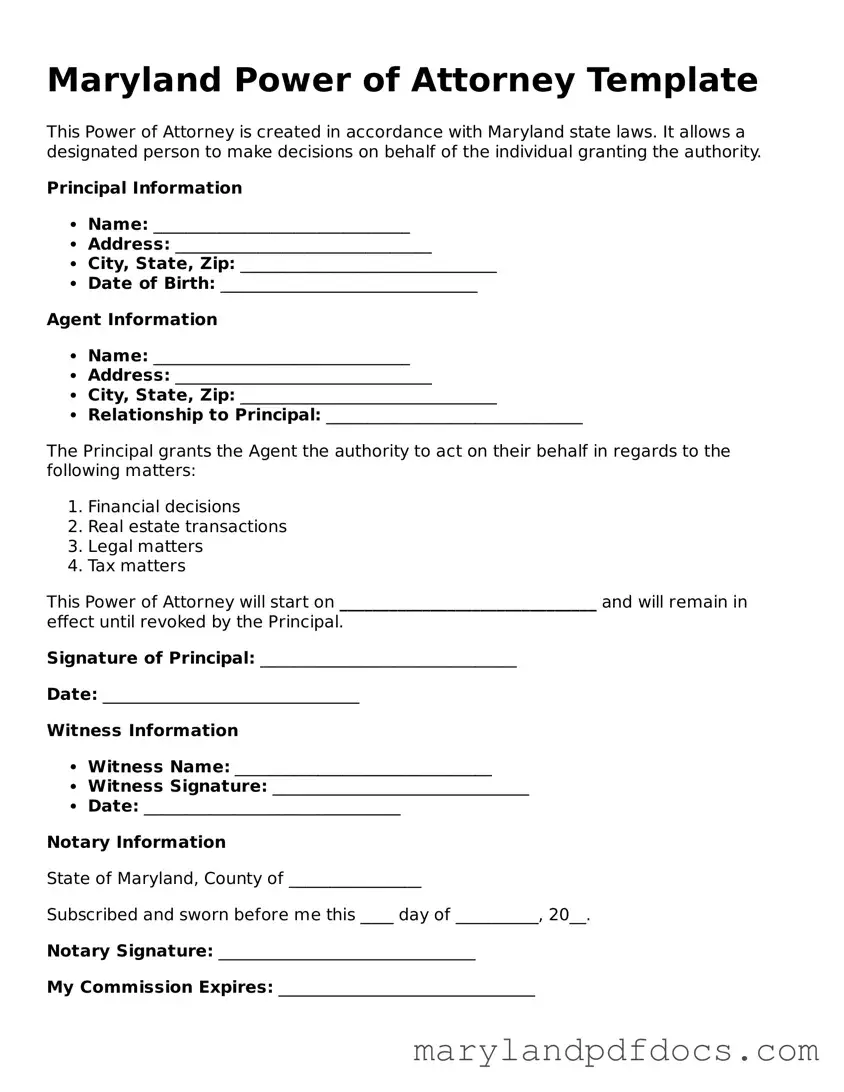What is a Power of Attorney in Maryland?
A Power of Attorney (POA) in Maryland is a legal document that allows one person, known as the principal, to grant another person, referred to as the agent or attorney-in-fact, the authority to act on their behalf. This authority can cover a wide range of decisions, including financial matters, healthcare decisions, and property management, depending on how the document is structured.
What types of Power of Attorney are available in Maryland?
In Maryland, there are several types of Power of Attorney. The most common are the General Power of Attorney, which gives broad powers to the agent, and the Limited Power of Attorney, which restricts the agent's authority to specific tasks or decisions. Additionally, a Durable Power of Attorney remains effective even if the principal becomes incapacitated, while a Non-Durable Power of Attorney ceases to be effective upon the principal's incapacitation.
How do I create a Power of Attorney in Maryland?
To create a Power of Attorney in Maryland, the principal must complete a written document that clearly states their intent to grant authority to the agent. This document must be signed by the principal in the presence of a notary public. It is also advisable to include specific powers being granted and any limitations to ensure clarity. While not legally required, having witnesses can provide additional validation.
Do I need to have a lawyer to create a Power of Attorney?
While it is not mandatory to hire a lawyer to create a Power of Attorney in Maryland, consulting with one can be beneficial. A lawyer can provide guidance on the specific powers to include, help ensure that the document complies with state laws, and address any concerns regarding the principal's needs and wishes.
Can I revoke a Power of Attorney in Maryland?
Yes, a Power of Attorney can be revoked in Maryland at any time, as long as the principal is mentally competent. To revoke the POA, the principal should create a written revocation document and notify the agent and any relevant third parties, such as banks or healthcare providers, that the authority has been terminated. This ensures that the agent's powers are no longer recognized.
What happens if the principal becomes incapacitated?
If the principal becomes incapacitated and has executed a Durable Power of Attorney, the agent can continue to act on the principal's behalf. However, if the Power of Attorney is non-durable, it will become ineffective upon the principal's incapacitation. It is crucial for the principal to consider their needs and choose the appropriate type of POA to ensure their wishes are honored.
What are the responsibilities of the agent under a Power of Attorney?
The agent has a fiduciary duty to act in the best interests of the principal. This means they must manage the principal's affairs honestly and transparently, keeping accurate records of all transactions. The agent should avoid conflicts of interest and must follow the specific instructions outlined in the Power of Attorney document.
Can a Power of Attorney be used for healthcare decisions?
Yes, a specific type of Power of Attorney known as a Healthcare Power of Attorney can be used for healthcare decisions. This document allows the agent to make medical decisions on behalf of the principal if they are unable to do so themselves. It is essential for the principal to discuss their healthcare wishes with the agent to ensure that their preferences are respected.
Is a Power of Attorney valid if the principal moves to another state?
A Power of Attorney executed in Maryland remains valid in other states, provided it complies with the laws of the state where it is being used. However, some states have specific requirements for Powers of Attorney, so it is wise for the principal to check local laws and consider updating their POA if they move to ensure it meets all legal standards.
What should I do if I suspect my agent is abusing their power?
If there is a suspicion that the agent is abusing their power, it is important to act quickly. The principal can revoke the Power of Attorney if they are still competent. Additionally, they may want to consult with an attorney to explore options for legal recourse, which may include reporting the agent to authorities or pursuing legal action to recover any mismanaged assets.

